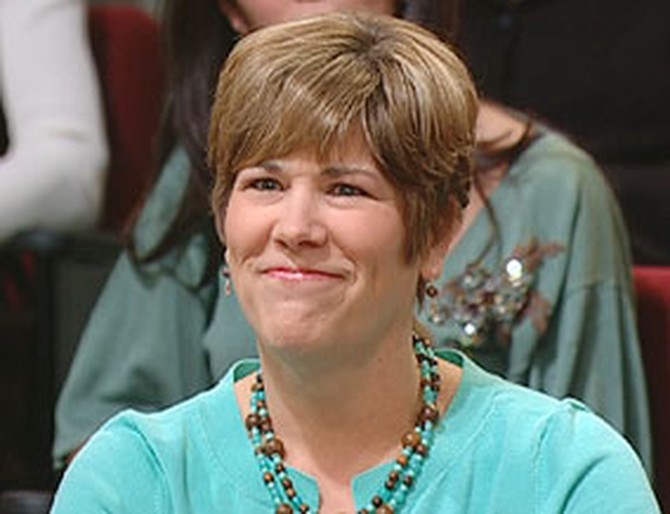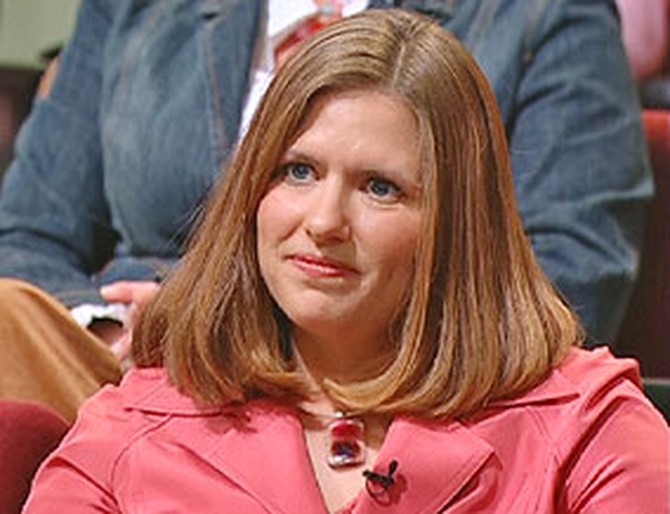Weight Loss Rules
By Bob Greene

Bob Greene, Oprah's fitness expert and friend, has been with her every step of the way during her weight loss ups and downs. After joining the intense Boot Camp, Oprah "got with the program" and made a commitment to her health.
During a trip to Africa, Oprah strayed from Bob's healthy eating plan. She admits that she ate bread and potatoes almost every night—and now she's paying for it! When she returned from her vacation a few pounds heavier, Oprah says Bob asked her, "Has anybody told you the truth about yourself?"
The truth is, Bob says, most people need a wake-up call. For some people—like Oprah—you need to be a little bit tough. Oprah admits that she probably wouldn't have listened to anything Bob taught her if he had said it nicely. "I need that sledgehammer," she says.
Weight loss is a daily struggle for many people—including Oprah. Bob says every dieter should keep in mind two sets of weight loss rules. "There's one set for just making the scale move," he says. "That just follows the laws of physics—you have to do x, y and z, and if you do them, the scale moves. But then there's the other thing...what's going to keep you doing those things for the rest of your life? That's where it gets complicated."
Thousands of viewers wrote to Bob asking for weight loss advice.
During a trip to Africa, Oprah strayed from Bob's healthy eating plan. She admits that she ate bread and potatoes almost every night—and now she's paying for it! When she returned from her vacation a few pounds heavier, Oprah says Bob asked her, "Has anybody told you the truth about yourself?"
The truth is, Bob says, most people need a wake-up call. For some people—like Oprah—you need to be a little bit tough. Oprah admits that she probably wouldn't have listened to anything Bob taught her if he had said it nicely. "I need that sledgehammer," she says.
Weight loss is a daily struggle for many people—including Oprah. Bob says every dieter should keep in mind two sets of weight loss rules. "There's one set for just making the scale move," he says. "That just follows the laws of physics—you have to do x, y and z, and if you do them, the scale moves. But then there's the other thing...what's going to keep you doing those things for the rest of your life? That's where it gets complicated."
Thousands of viewers wrote to Bob asking for weight loss advice.

Viewers who wrote Bob say their biggest weight loss problem is shedding those last few pounds! Judy, who has lost more than 100 pounds, says she'd love to lose more...but she can't seem to get the scale to budge!
Judy says she's been battling obesity for years. At age 21, she lost 100 pounds. Then she gained it back, and at 30, she lost the same 100 pounds. Finally after gaining the weight once again, at age 45, she took off 119 pounds. Now, Judy is 48, and she's only 30 pounds from her goal weight. "It's just infuriating," she says. "To work out...to eat right and the scale still doesn't move!"
Bob says a person's weight naturally plateaus at a certain point so the body's organs can adjust. Once this happens, you can start shedding those last few pounds by increasing the intensity of your workout.
Activities such as aerobics may help you lose weight at first, but eventually those workouts become less challenging. He suggests working out on a treadmill, which allows you to increase the pace and the incline over time.
"It's physics," he says. "You at your given body weight today are exercising with a 3 percent hill at 3.3 miles an hour—that's great. Your weight's going to adjust and come down. ... But, you need to increase the workload, and most important, the pace. [You can] methodically break through each plateau by increasing how fast you move."
Judy says she's been battling obesity for years. At age 21, she lost 100 pounds. Then she gained it back, and at 30, she lost the same 100 pounds. Finally after gaining the weight once again, at age 45, she took off 119 pounds. Now, Judy is 48, and she's only 30 pounds from her goal weight. "It's just infuriating," she says. "To work out...to eat right and the scale still doesn't move!"
Bob says a person's weight naturally plateaus at a certain point so the body's organs can adjust. Once this happens, you can start shedding those last few pounds by increasing the intensity of your workout.
Activities such as aerobics may help you lose weight at first, but eventually those workouts become less challenging. He suggests working out on a treadmill, which allows you to increase the pace and the incline over time.
"It's physics," he says. "You at your given body weight today are exercising with a 3 percent hill at 3.3 miles an hour—that's great. Your weight's going to adjust and come down. ... But, you need to increase the workload, and most important, the pace. [You can] methodically break through each plateau by increasing how fast you move."

Even exercise fanatics have a tough time losing those last 20 pounds. Rachelle, an avid runner who has completed 10 marathons, says she just doesn't understand why she's still overweight. "I get really frustrated because I work out so much," she says. "I feel like for all that running, I should be thin."
Basically, Bob says, you have to burn more calories than you take in.
In addition to exercise, your eating patterns will affect your weight loss. You have to allow yourself to feel hunger, Bob says. That little gnawing feeling you get in your stomach late at night means that your body is ready to "eat the fat." When you give in to the craving, he says, you are eating your results. "If you go into a calorie deficit, you're going to be a little bit hungry. People need to learn how to accept that, be okay with that slight discomfort."
How can you ignore a growling stomach? Bob suggests to step away from the refrigerator, and find something to occupy your mind and make you feel good. A bubble bath or a long walk can help take the edge off.
Basically, Bob says, you have to burn more calories than you take in.
In addition to exercise, your eating patterns will affect your weight loss. You have to allow yourself to feel hunger, Bob says. That little gnawing feeling you get in your stomach late at night means that your body is ready to "eat the fat." When you give in to the craving, he says, you are eating your results. "If you go into a calorie deficit, you're going to be a little bit hungry. People need to learn how to accept that, be okay with that slight discomfort."
How can you ignore a growling stomach? Bob suggests to step away from the refrigerator, and find something to occupy your mind and make you feel good. A bubble bath or a long walk can help take the edge off.

For the past 15 years, Jacara says she's tried every diet out there, but she can't quite reach her ideal weight. "I find that I get to a certain point where I'm close to my goal weight, and I sabotage myself," she admits. When she's in "the zone," Jacara says she exercises up to eight times a week, but still doesn't seem to lose weight.
Currently, Jacara weighs 162 pounds and she says she'd like to be 135. What more can she do?
First, Bob says, Jacara and millions of dieters should get rid of the "all or nothing" attitude. The key isn't about how often you exercise—it's about how consistent you are.
The one thing every dieter has to remember is that exercise is not negotiable. "Decide what's right for you—how much you are willing to do," he says. "Whether it's just 10 minutes or 20 minutes, and don't negotiate that."
Also, don't make the mistake of adjusting your diet before determining how often you're going to exercise. "You need to establish how active of a human being you're going to be, and then move on," Bob suggests. "Then your food has to adjust. If you exercise more, you're going to have the liberty to eat more."
Currently, Jacara weighs 162 pounds and she says she'd like to be 135. What more can she do?
First, Bob says, Jacara and millions of dieters should get rid of the "all or nothing" attitude. The key isn't about how often you exercise—it's about how consistent you are.
The one thing every dieter has to remember is that exercise is not negotiable. "Decide what's right for you—how much you are willing to do," he says. "Whether it's just 10 minutes or 20 minutes, and don't negotiate that."
Also, don't make the mistake of adjusting your diet before determining how often you're going to exercise. "You need to establish how active of a human being you're going to be, and then move on," Bob suggests. "Then your food has to adjust. If you exercise more, you're going to have the liberty to eat more."
Published 01/01/2006

